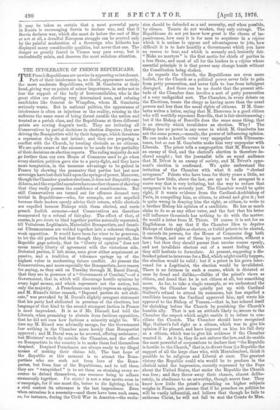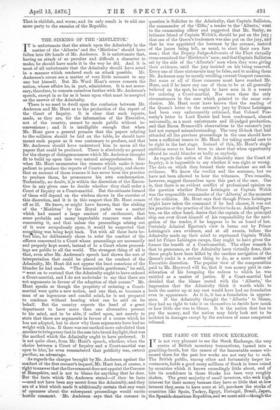THE INTOLERANCE OF FRENCH REPUBLICANS.
THE French Republicans are unwise in appearing so intolerant. I Part of their intolerance is, no doubt, appearance merely, the more moderate Republicans, with M. Gambetta at their head, giving way on points of minor importance, in order not to lose the support of the body of Irrreconcilables, who in the great cities are electing very determined men, and refusing candidates like General de Wimpffen, whom M. Gambetta seriously wants. But in national politics the appearance of intolerance is often as injurious as the reality, rousing in the sufferers the same sense of being thrust outside the nation and treated as a pariah class, and the Republicans at three different points are sowing dragon's teeth. They are irritating all Conservatives by partial decisions in election disputes ' • they are driving the Bonapartists wild by their language, which threatens a repression they do not intend ; and they are preparing a conflict with the Church, by treating clericals as no citizens. We are quite aware of the excuses to be made for the partiality of their decisions on election reports. The ruling majority do not go further than our own House of Commons used to go when every election petition gave rise to a party-fight, and they have more temptation, in the immense advantage to be gained in France by showing the peasantry that parties but just now sovereign have lost their hold upon the springs of power. Moreover, though the Chamber quashes elections, it does not disqualify can- didates, and the expelled members have another chance of showing that they really possess the confidence of constituencies. But still Conservatives are turned out for offences deemed very trivial in Republicans—who, for example, are not expelled because their leaders openly advise their return, while clericals are expelled because Bishops wish them elected, and cures preach foolish sermons—and Conservatives are therefore exasperated by a refusal of fair-play. The effect of that, of course, is pro .tanto to bind together parties naturally separated, till Voltaire= Legitimists, Materialist Bonapartists, and fanati- cal Ultramontanes are welded together into a coherent though weak opposition. It would have been far wiser to be generous, to let the old parties feel that though they cannot prevail, the Republic gags nobody, that its " liberty of opinion " does not mean merely liberty of agreement with the victorious side. Defeated parties, if left alone, soon grow either acquiescent or passive, and a tradition of tolerance springs up of the highest value in moderating future conflict. At present the Conservatives, and more especially the Bonapartists, have reason for jiaying, as they said on Tuesday through M. Raoul Duval, that they are in presence of a " Government of Combat,"—of a Government, that is, which will discourage hostile opinions by every legal means, and which represents not the nation, but only the majority. A Frenchman can rarely repress an epigram, and M. Ricard's bitter remark, "Deposed parties do not abdi- cate," was provoked by M. Duval's slightly arrogant statement that his party had abdicated in presence of the elections, but language of that kind to the second strongest faction in France is most imprudent. It is as if Mr. Disraeli had told the Liberals, when promising to abstain from factious opposition, that he did not care how factious a minority might be. We dare say M. Ricard was advisedly savage, for the Government fear nothing in the Chamber more keenly than Bonapartist approval ; and M. Duval was, as he avowed, offering assistance ; but Ministers' words fly outside the Chamber, and the effect on Bonapartists in the country is to make them feel themselves despised. Despised Frenchmen are always ready to try illegal means of making their claims felt. The best hope of the Republic at this moment is to attract the Bona- partists who are such not from love of the Bona- partes, but from fear of the Republicans, and to tell them they are " vanquished " is to set them on straining every re- source to defend themselves, one resource being to adhere strenuously together. Vice victis I is not a wise motto even in a' campaign, for if one must die, better to die fighting, but in' a civil contest its utterance is the last imprudence. Even when ostracism is a necessity—and there have been such eases, as, for instance, during the Civil War in America—the exclu- sion should be defended as a sad necessity, and when possible, by silence. Taunts do not weaken, they only outrage. The Republicans do not yet know how great is the charm of im- passiveness, how easy it is for men to acquiesce in a regime which it is useless to oppose and advantageous to join, how difficult it is to hate heartily a Government which you have no reason to fear, and which is serenely ande-leniently fair. " Make no martyrs " is the first motto for chiefs of parties in a free State, and most of all for the leaders in a regime whose essential principle it is that power may change hands without the Constitution being shaken.
As regards the Church, the Republicans are even more foolish, for the Church as a political power never fails to gain from petty persecution, and never fails to lose from indulgent disregard. And there can be no doubt that the present atti- tude of the Chamber does involve a sort of petty persecution of a very undignified sort. The Chamber, in every debate on the Elections, treats the clergy as having more than the usual powers and less than the usual rights of citizens. If M. Gam= betta writes a letter, saying that M. Bienvenu is a good citizen who will worthily represent Bonville, that is fair electioneering ; but if the Bishop of Bonville does the same same thing, that is an atrocity which invalidates an election. Why The Bishop has no power in any sense in which M. Gambetta has not the same power,—namely, the power of influencing opinion. He can make a hostile voter very unpopular with Ultramon- tanes, but so can M. Gambetta make him very unpopular with Liberals. The priest tells a congregation that M. Bienvenu is an enemy of God, and the elericars election is therefore de- clared naught ; but the journalist tells an equal audience that M. Devot is an enemy of society, and M. Devot's oppo- nent's election is confirmed. We quite understand the irritation of the Chamber with what it calls " clerical arrogance." Priests who have been for thirty years a little, no matter how little, above the law, are apt to be arrogant in a suave way that is very irritating, but the way to reduce that arrogance is to be severely just. The Chamber would be quite right, if it wants evidence from the Cardinal-Archbishop of Paris, in compelling him, as citizen, to attend and give it ; but is quite wrong in denying him the right, as citizen, to write to a brother Bishop his opinion of a candidate. He has as much claim to do so as any other voter, and the fact that his letter will influence thousands has nothing to do with the matter. So would a letter from M. Thiers. Of course it is not for an Englishman to say that if the Chamber likes to deprive Bishops of their rights as electors, or forbid priests to be elected, it exceeds its powers, for the House of Commons dort both those things, and one of them by mere resolution, wiThout a law ; but then they should pursue that unwise course openly, and not invalidate electors out of a secret feeling which they still hesitate to formulate. At present, supposing a &s- hocked priest to intervene for a Red, Which might readily happen, the election would be valid ; but if a priest in his gown inter- vened for a Legitimist, the election would be invalidated. There is no fairness in such a course, which is dictated at once by dread and dislike,—dislike of the priest's views as citizen, and dread that he is not citizen at all, but something more. As far, to take a single example, as we understand the reports, the Chamber has quietly put up with Cardinal Guibert's refusal to attend its summons, but has expelled a candidate because the Cardinal approved him, and wrote his approval to the Bishop of Vannes,—that is, has solaced itself for shrinking before the Church by punishing the Church's humble ally. That is not an attitude likely to secure to the Chamber the respect which might enable it to refuse to con- ciliate the Church. The Chamber should have recognised Mgr. Guibert's full right as a citizen, which was to give his opinion if he pleased, and have imposed on him his full duty as a -citizen, which was .to give his evidence if the Chamber wanted it. As it is, they do not enforce the law, and do enable the most powerful of corporations to declare that " the Republic is hostile to the Church," that is, to divert from #t'ae Republic the support of all the large class who, with Montalembert, think it possible to be religious and Liberal at once. The greatest victory the Republic could win would be to produce in the clerical mind the impression, recently expressed by the Pope about the United States, that under the Republic the Church was free ; and they throw away their chance, almost delibe- rately, in obedienceto an unworthy, though secret fear. They know how little the _priest's -preaching on higher subjects weighs in France, yet assume that if he preaches on politics he will be vastly influential, and believe that though he fails to enthrone Christ, he will not fail to seat the Comte de Mun. That is childish, and worse, and its only result is to add one more party to the enemies of the Republic.



































 Previous page
Previous page